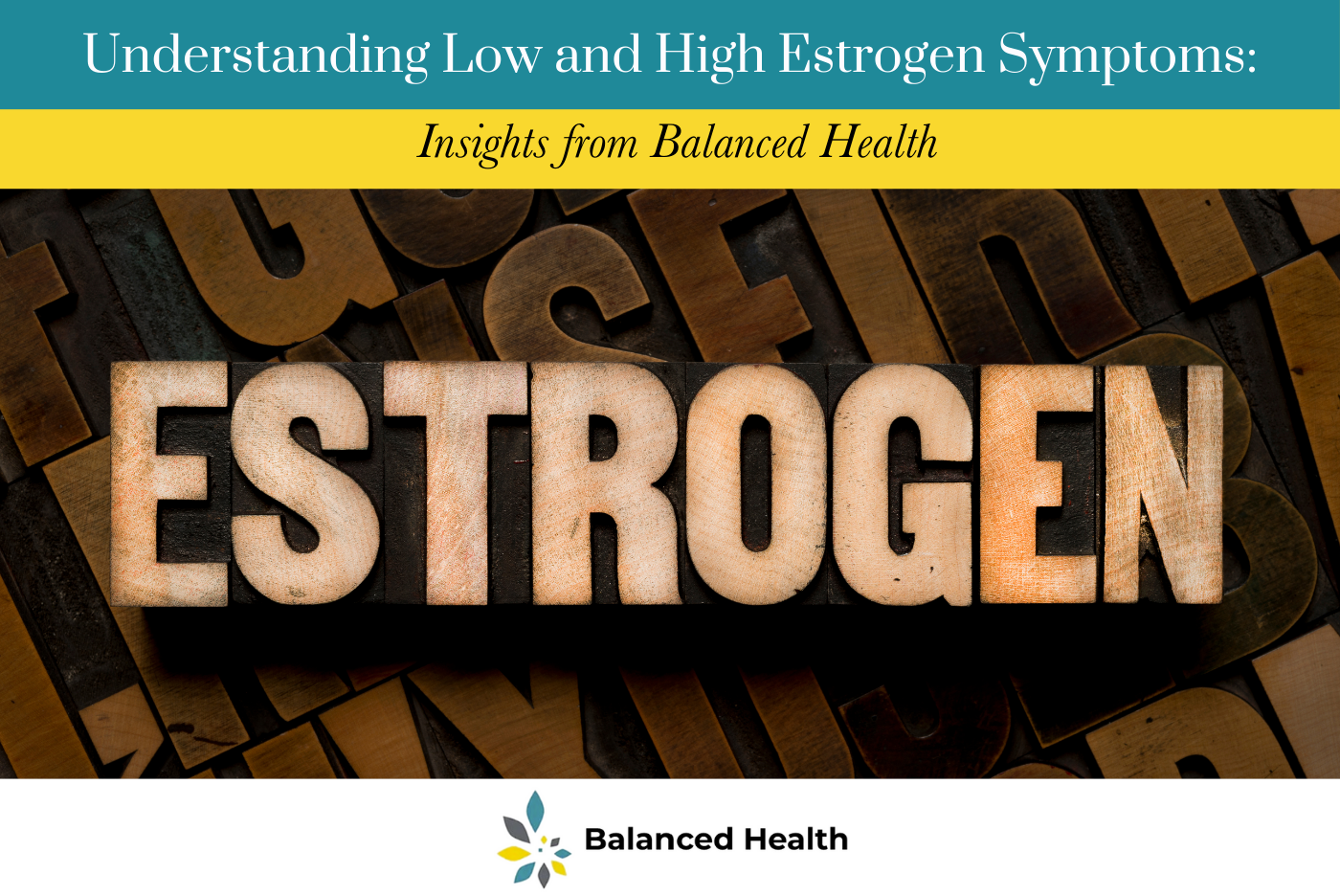
At Balanced Health, we specialize in helping you understand and manage hormonal imbalances to restore optimal health and vitality. This blog will explore the symptoms of both low and high estrogen, their potential causes, and ways to address them.
What is Estrogen?
Estrogen is a primary sex hormone in women, although men also have it in smaller amounts. It regulates the menstrual cycle, supports pregnancy, maintains bone density, and contributes to the development of secondary sexual characteristics like breast tissue.
While normal estrogen levels fluctuate naturally during menstrual cycles, pregnancy, and menopause, prolonged imbalances can result in noticeable symptoms.
Symptoms of Low Estrogen
Low estrogen levels often occur during menopause but can affect women of all ages due to underlying health issues, genetics, or lifestyle factors. Symptoms include:
- Irregular or Missed Periods: Without enough estrogen, the menstrual cycle may become irregular or stop altogether.
- Hot Flashes and Night Sweats: Sudden waves of heat are common in women with low estrogen levels, especially during menopause.
- Vaginal Dryness: A lack of estrogen can lead to thinning and dryness of the vaginal walls, causing discomfort during intercourse.
- Decreased Libido: Hormonal changes often reduce sexual desire and responsiveness.
- Mood Swings and Depression: Low estrogen may affect serotonin levels, resulting in mood instability or depression.
- Bone Weakness: Estrogen is essential for maintaining bone density, and low levels can increase the risk of osteoporosis.
- Fatigue: Many women report persistent tiredness and lack of energy.
Symptoms of High Estrogen
Excessive estrogen levels, or estrogen dominance, may result from factors like hormonal therapies, obesity, stress, or certain health conditions. Symptoms include:
- Weight Gain: Often around the hips, thighs, or midsection.
- Irregular Periods: High estrogen can disrupt the normal menstrual cycle.
- Tender or Swollen Breasts: Increased estrogen can lead to breast discomfort.
- Bloating: Water retention and digestive issues are common complaints.
- Mood Swings and Anxiety: High estrogen levels can overstimulate the nervous system, leading to emotional distress.
- Fatigue: Excess estrogen can make it difficult for the body to maintain energy.
- Hair Loss: Imbalances may lead to thinning hair or hair loss.
Causes of Estrogen Imbalances
- Age and Menopause: Natural aging often leads to decreased estrogen production.
- Lifestyle Factors: Poor diet, lack of exercise, and stress can disrupt hormonal balance.
- Medical Conditions: Conditions like PCOS, thyroid dysfunction, or ovarian failure can affect estrogen levels.
- Medications: Hormonal birth control or certain medications may raise or lower estrogen.
- Environmental Factors: Exposure to endocrine-disrupting chemicals in plastics, cosmetics, and pesticides can mimic estrogen and lead to imbalances.
Treatment Options at Balanced Health
At Balanced Health, we offer personalized care to address hormonal imbalances, including:
- Hormone Testing: Comprehensive blood and saliva testing to determine your hormone levels.
- Lifestyle Coaching: Nutritional advice, exercise recommendations, and stress management strategies to support natural balance.
- Bioidentical Hormone Replacement Therapy (BHRT): A natural and tailored approach to replenish or regulate estrogen levels.
- Supplementation: Specific vitamins, minerals, and herbal remedies to support hormone health.
- Detoxification: Programs to eliminate toxins that may disrupt hormonal balance.
Comprehensive Q&A Section
Q: Can men have high or low estrogen levels?
A: Yes, men can experience estrogen imbalances, leading to symptoms such as gynecomastia (breast tissue growth), reduced libido, and emotional changes.
Q: How do I know if my symptoms are due to estrogen imbalance?
A: A consultation and hormone test at Balanced Health can confirm whether your symptoms are linked to estrogen levels or other hormonal issues.
Q: Can diet affect estrogen levels?
A: Absolutely. Foods like soy, flaxseeds, and processed items can influence estrogen production. A balanced diet is critical for maintaining optimal hormonal health.
Q: Are there natural ways to manage estrogen levels?
A: Yes, natural approaches include stress management, regular exercise, and a healthy diet rich in cruciferous vegetables and omega-3 fatty acids.
Q: What happens if estrogen imbalances go untreated?
A: Untreated imbalances can lead to long-term health issues such as osteoporosis, cardiovascular disease, or metabolic syndrome.
Contact Us
If you suspect you may have low or high estrogen levels, the experts at Balanced Health are here to help. Our personalized treatments aim to restore balance and improve your quality of life.
Balanced Health
📍 Address: 1819 Union St, San Francisco, CA 94123
📞 Phone: (415) 915-5454
📧 Email: contact@drerikahorowitz.com
🌐 Website: BalancedHealthSF.com
Take the first step toward hormonal balance. Contact us today to schedule your consultation!
Let Balanced Health guide you toward a healthier, more vibrant life with expert care for estrogen imbalances.
 Balanced Health
Balanced Health